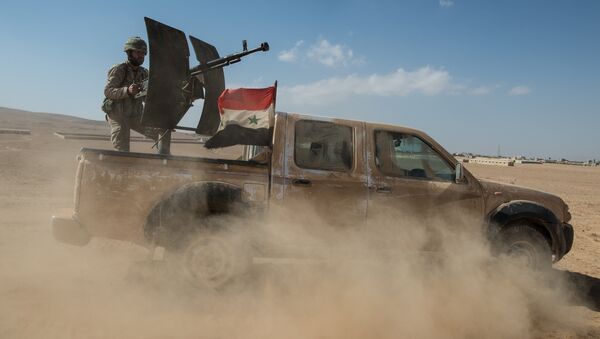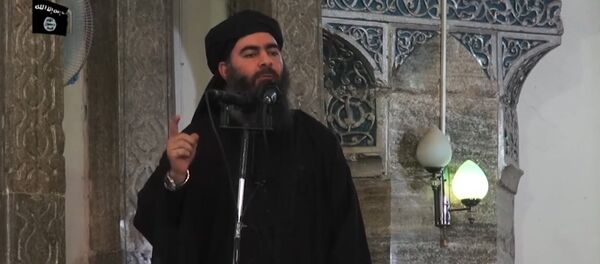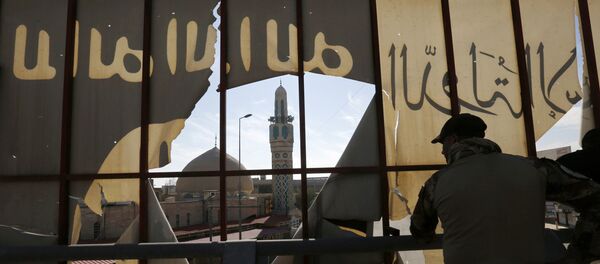In addition to al-Baghdadi, the liquidated Daesh commanders included the "emir of Raqqa" Abu al-Hadji al-Mysri, the emir Ibrahim An-Naef al-Hajj, who controlled the area from Raqqa to Es-Suhne, and the head of the "Daesh security service" Suleiman Al-Shawah, according to the Russian Defense Ministry.
The death of al-Baghdadi as the result of a Russian airstrike was first reported on June 10 by Syrian state television and was later translated by some British outlets. However, the news did not make global headlines.
There have already been several times when al-Baghdadi was reported dead. His death was reported in June and December 2016, April 2015 and November 2014. In April 2015, he was reported dead after an injury, and in October 2016, reports emerged that al-Baghdadi had been poisoned. In January 2017, media reported that al-Baghdadi suffered heavy injuries in an airstrike.
The Russian Defense Ministry first verified the information regarding militant deaths resulting from the airstrike on July 16, when it issued an official statement.
While the information of al-Baghdadi’s death still awaits confirmation, there are two reasonable questions regadrding the matter. First, how could several Daesh commanders and three hundred additional militants gather in one place and for what purpose?
For example, while reporting to Russian President Vladimir Putin, Defense Minister Sergei Shoigu said Friday that "over 100 terrorists, including members of the Daesh leadership," were killed.
Second, does the threat posed by a terrorist or militant organization like Daesh seriously depend on the personalities of its leadership? There are two polar views on subject, and the question remains open.
Abu Bakr al-Baghdadi (born Ibrahim Awad Ibrahim al-Badri), also known as Abu Dua, was born in 1971 in the city of Samarra in Iraq.
After the Western coalition invaded Iraq in 2003, al-Baghdadi joined the Iraqi insurgents. In 2004, he went to jail and spent around a year in the Bucca Camp, a US prison in Iraq. After his release, he participated in the activities of various terrorist groups comprised of Islamist militants.
Al-Baghdadi claimed he was of Quraysh origin, in other words a direct descendant of Prophet Mohammed. Leadership of the Muslim community traditionally passed to a member of the Quraysh. Despite the fact that al-Baghdadi’s belonging to the Quraysh was never confirmed, his claim legitimized him as the spiritual leader.
The military structure of Daesh was built by former members of the Iraqi military and the Ba’ath Party. However, they needed a spiritual leader because radicalism turned out to be a better platform for Daesh than the pan-Arabism adopted by the Ba’ath Party.
On June 29, 2014, al-Baghdadi was proclaimed the caliph of Daesh, a "caliphate" created on the territories Daesh managed to seize in Syria and Iraq.
On July 5, he delivered his first public speech at Mosul’s Great Mosque, declaring jihad.
"However, in his three years of being the caliph, al-Baghdadi could not become the spiritual leader of the Muslim community, even despite his attempts to copy the behavior of charismatic Palestinian and Lebanese Shia imams, his de facto ideological rivals," an article in the Russian online newspaper Vzglyad read.
Possibly, after the liquidation of the majority of Daesh’s initial leaders, the terrorist organization will see a crisis in its command. The question is how long this crisis will last. Currently, Raqqa is surrounded and it is nearly impossible to find a new charismatic leader among young supporters of Daesh.
"The Syrian Army should not miss this chance because the leadership collapse is likely to affect combat planning within Daesh. Nevertheless, the Russian airstrike in Raqqa creates a unique chance to consolidate the achievements the Syrian Army has gained in the last 18 months," the article concluded.








